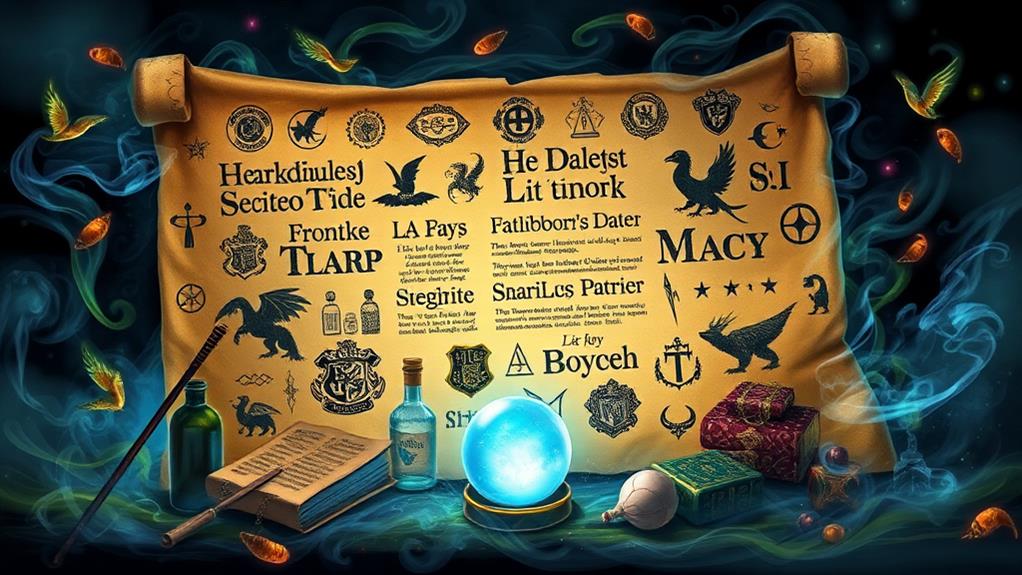
To compare wizarding school specialties, first understand each school's history. Analyze curriculum to see what subjects they prioritize. Evaluate the faculty's expertise and teaching methods. Compare student life by looking at dorm setups and house systems. Review extracurricular activities for options that match your interests. Assess potion-making courses for their depth and approach. Examine spellcasting techniques taught, including innovative methods. Look into Dark Arts defense programs and their thoroughness. Finally, consider alumni achievements and the schools' reputations. Each of these tips reveals unique aspects of what makes Hogwarts, Beauxbatons, Durmstrang, and Ilvermorny distinct, and there's much more to explore.
Understand School Histories
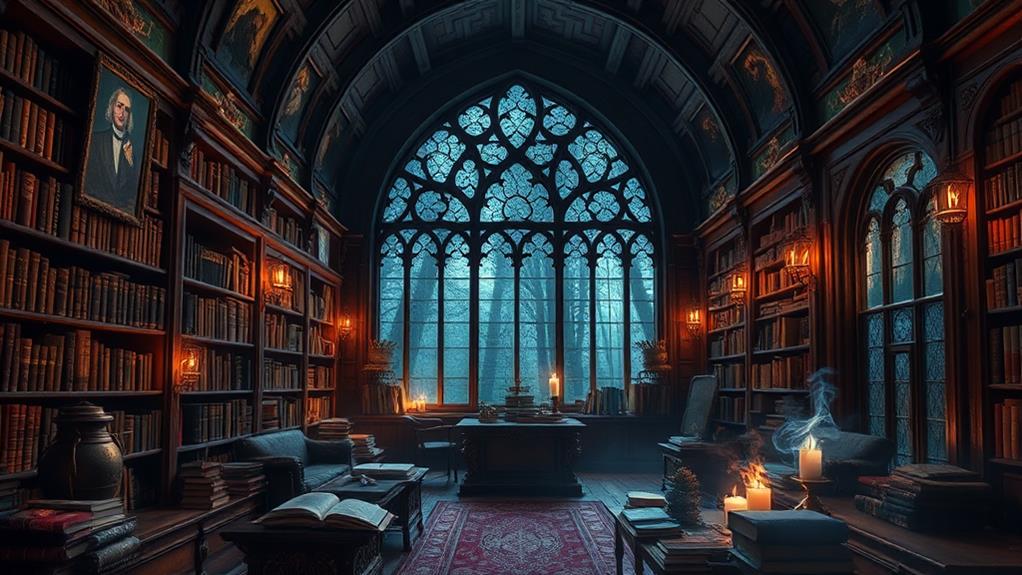
Understanding the histories of wizarding schools is crucial for grasping their unique specialties. When you immerse yourself in the background of each institution, you uncover the roots of their magical traditions and why they excel in particular areas. For instance, Hogwarts, founded in the 10th century by four legendary wizards and witches, reflects the diverse talents and values of its founders. Gryffindor’s bravery, Slytherin’s ambition, Ravenclaw’s intellect, and Hufflepuff’s loyalty shape the school’s broad curriculum and house system. These foundational principles not only influence student life at Hogwarts but also play a significant role in the magical community at large. As you delve deeper into the histories of these institutions, you will find that the top wizarding societies explored often reflect the core values and specialties established by their founders. This interconnectedness enriches our understanding of how different schools contribute to the broader tapestry of magical knowledge and practice.
Beauxbatons Academy of Magic, established in 1290, has a rich history tied to elegance and artistry. Located in the Pyrenees, its focus on grace and charm is evident in its teaching methods and student demeanor. Meanwhile, Durmstrang Institute, known for its secretive nature, was founded in the late Middle Ages and emphasizes martial magic and the Dark Arts. This focus stems from its founders' belief in rigorous discipline and combat readiness.
Analyze Curriculum Focus
When analyzing the curriculum focus of different wizarding schools, it becomes clear that each institution tailors its teaching to reflect its core values and historical strengths. You should start by examining the subjects offered and their relative emphasis. For example, Hogwarts places a strong focus on traditional subjects like Potions, Transfiguration, and Defense Against the Dark Arts, reflecting its balanced approach to both theoretical and practical magic.
In contrast, Beauxbatons Academy of Magic emphasizes charm work and elegance, aligning with its reputation for producing sophisticated and refined wizards. Their curriculum might include advanced courses in aesthetics and enchantments, promoting a certain flair in spellcasting.
Durmstrang Institute, known for its rigorous and sometimes controversial practices, focuses heavily on martial magic and Dark Arts. This school's curriculum is designed to create resilient and powerful wizards who can handle offensive and defensive spells with equal proficiency.
Look at how Ilvermorny School of Witchcraft and Wizardry integrates Native American magic and folk traditions into its programs, reflecting its North American heritage. These unique subjects set it apart from its European counterparts.
Evaluate Magical Faculty
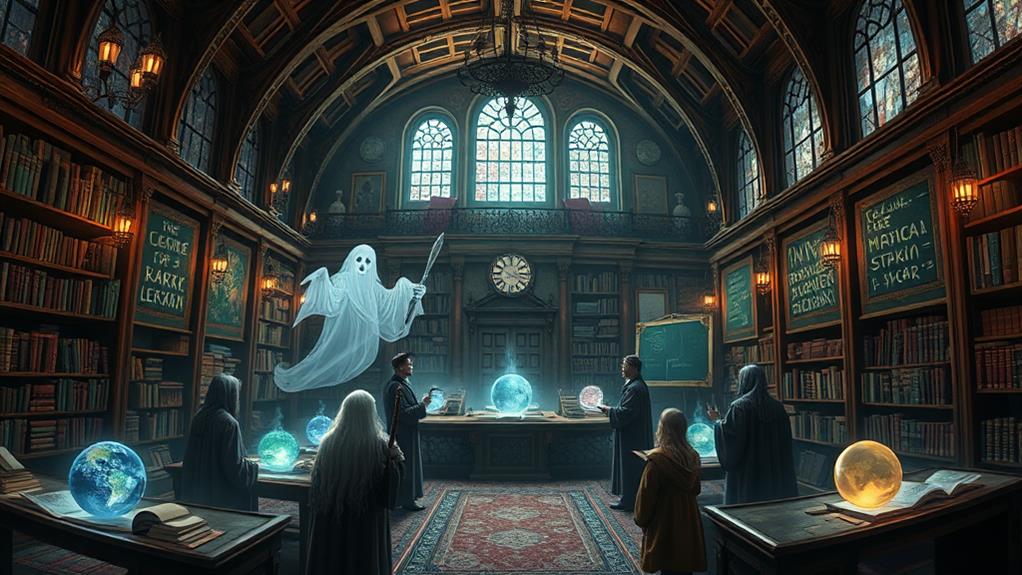
Evaluating the magical faculty of wizarding schools reveals much about the institutions' strengths and priorities. When you look at a school's faculty, you're not just seeing a list of names and titles; you're glimpsing the expertise and values that shape students' education. Begin by researching the credentials and backgrounds of the professors. Are they published authors, renowned spellcasters, or experts in niche magical fields? Their qualifications can give you insight into the academic rigor and specialization the school offers.
Next, consider the faculty's teaching styles and accessibility. Do they encourage hands-on learning and individual mentorship, or is their approach more lecture-based and theoretical? Schools with a more interactive teaching style often produce wizards who are better prepared for real-world magical challenges.
Additionally, note the diversity of the faculty. A mix of backgrounds and magical disciplines can foster a richer, more all-encompassing learning environment. Schools that prioritize hiring diverse faculty members are likely committed to offering a well-rounded education.
Compare Student Life
Diving into student life at various wizarding schools offers a glimpse into the everyday experiences that shape young witches and wizards. Each institution has its unique atmosphere, customs, and traditions that influence students' daily lives. As you compare these schools, consider the following aspects:
- Boarding Arrangements: Some schools, like Hogwarts, sort students into houses where they live, study, and bond with their housemates. Others, like Ilvermorny, have dormitories that foster a more collective student experience.
- Daily Schedules: The structure of the school day can vary substantially. Hogwarts has a traditional class schedule with breaks, while Beauxbatons Academy emphasizes longer, immersive lessons that may include outdoor practical sessions.
- School Meals: Dining experiences also differ. Hogwarts is known for its grand feasts in the Great Hall, whereas Mahoutokoro provides students with bento boxes filled with magical and non-magical delicacies.
- Uniforms and Attire: The dress code can reflect a school's culture. Durmstrang students wear heavy furs and dark robes due to their cold climate, contrasting with Castelobruxo's light, tropical-inspired uniforms.
Review Extracurricular Activities
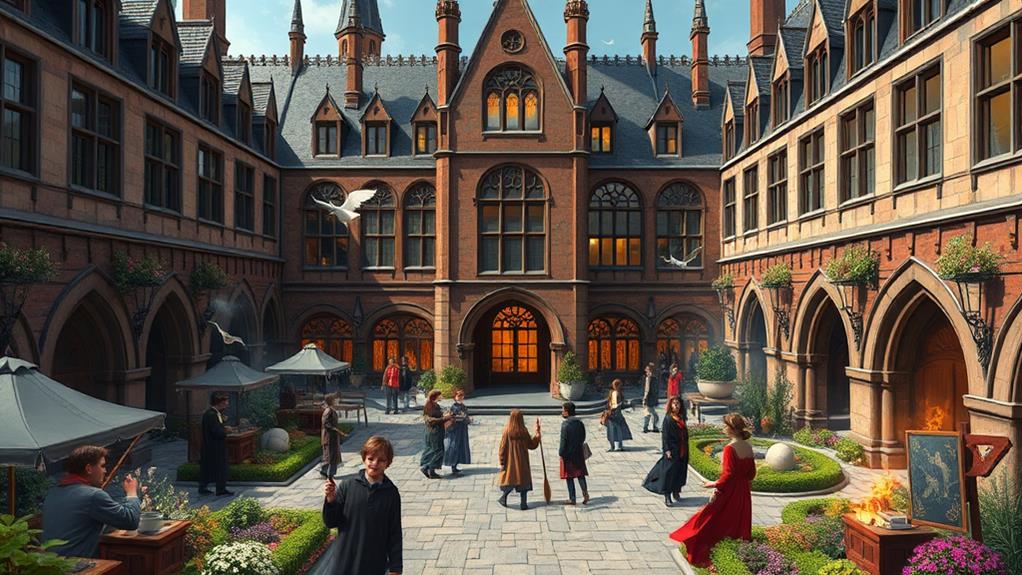
Extracurricular activities at wizarding schools greatly enrich students' educational experiences. You'll find that each institution offers unique clubs and societies that reflect their cultural and magical heritage. For instance, Hogwarts boasts the renowned Dueling Club, where students practice spellcasting in a safe, competitive environment. Meanwhile, Beauxbatons Academy offers ballet and fine arts clubs, emphasizing grace and artistic expression.
Don't overlook Quidditch teams, either. They're not just about flying and scoring; they're a crucial part of school spirit and camaraderie. Durmstrang Institute prides itself on a fiercely competitive Quidditch league, fostering teamwork and strategic thinking. If you're drawn to leadership, many schools have student councils or prefect systems where you can hone your organizational skills.
Magical music and drama groups also abound. Ilvermorny School of Witchcraft and Wizardry, for example, has a thriving magical theater club that stages spellbinding performances. Clubs focusing on potion-making, Herbology, and ancient runes can deepen your academic interests while offering hands-on experiences.
When comparing schools, consider how these extracurriculars align with your passions and goals. The right activities can profoundly impact your growth as a witch or wizard, providing a well-rounded education that extends beyond the classroom.
Investigate Magical Creatures Programs
While extracurricular activities offer a rich and diverse experience, the study of magical creatures adds another fascinating dimension to a wizarding education. When investigating magical creatures programs across different schools, you'll find each offers unique insights and hands-on opportunities. To help you compare these programs effectively, consider these key aspects:
- Diverse Creature Encounters: Look for programs that offer a wide range of creatures, from the gentle Bowtruckles to the majestic Hippogriffs. Schools with diverse creature rosters provide broader learning experiences and practical skills.
- Fieldwork Opportunities: Schools that emphasize real-world encounters allow you to study creatures in their natural habitats. Whether it's tracking Unicorns in enchanted forests or observing Grindylows in mysterious lakes, fieldwork enriches your understanding.
- Experienced Professors: Check the qualifications of the magical creature professors. Instructors with extensive field experience, publications, and magical creature handling certifications offer invaluable knowledge and mentorship.
- Safety Protocols: Handling magical creatures can be risky. Guarantee the program has robust safety measures, including protective gear, emergency spells, and first-aid training. Schools prioritizing safety guarantee you can learn without unnecessary dangers.
Assess Potion-Making Courses
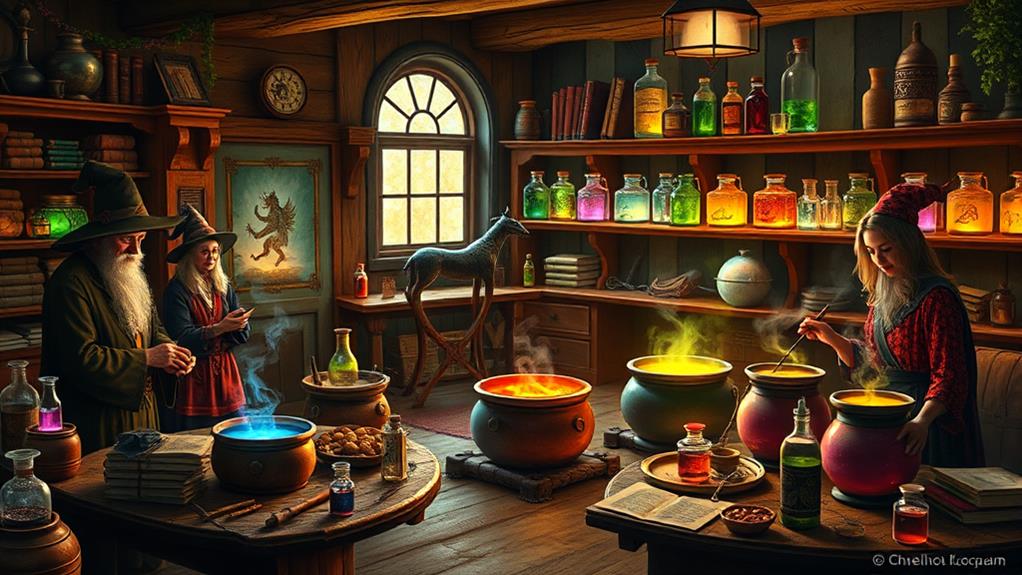
When evaluating potion-making courses, a school's curriculum can substantially impact your mastery of this meticulous craft. Start by examining the breadth and depth of potion recipes covered. An all-encompassing program should teach you everything from basic brews like the Wiggenweld Potion to more advanced concoctions such as Felix Felicis.
Next, consider the qualifications of the instructors. Are they experienced potion masters or notable researchers in the field? The expertise of your teachers can make a significant difference in your learning experience. Look for schools that offer hands-on labs and practical exams, as these will provide you with the opportunity to practice and perfect your skills.
Don't overlook the facilities. State-of-the-art equipment and well-stocked ingredient cupboards are essential for an exceptional potion-making education. Check if the school has partnerships with renowned apothecaries or access to rare ingredients, which can enhance your learning and experimentation.
Lastly, review alumni success stories. Graduates who have gone on to achieve notable accomplishments in potion-making can be a strong indicator of the program's quality. By carefully weighing these factors, you'll be well on your way to choosing the best school to hone your potion-making prowess.
Examine Spellcasting Techniques
Evaluating the spellcasting techniques taught at various wizarding schools is essential for anyone looking to master the art of magic. Each institution has its own unique approach, and understanding these can help you choose the best fit for your magical education.
First, consider the style of spellcasting. Some schools emphasize silent casting or non-verbal spells, which require greater mental discipline but offer stealth advantages. Others focus on traditional vocal incantations, ensuring clarity and precision in spell execution.
Second, assess the curriculum structure. Schools like Hogwarts integrate spellcasting with other subjects, offering a well-rounded education. In contrast, institutions such as Beauxbatons may have specialized courses that explore more advanced spellcasting techniques.
Third, examine the practical training methods. Hands-on practice is vital. Schools that provide real-world scenarios and frequent duels can better prepare you for unpredictable magical encounters. Look for schools that encourage experimentation and innovation in spell use.
Lastly, review the faculty expertise. Teachers with extensive field experience can offer invaluable insights and advanced techniques. Schools boasting renowned spellcasters as instructors will certainly provide a richer learning experience.
Look Into Dark Arts Defense
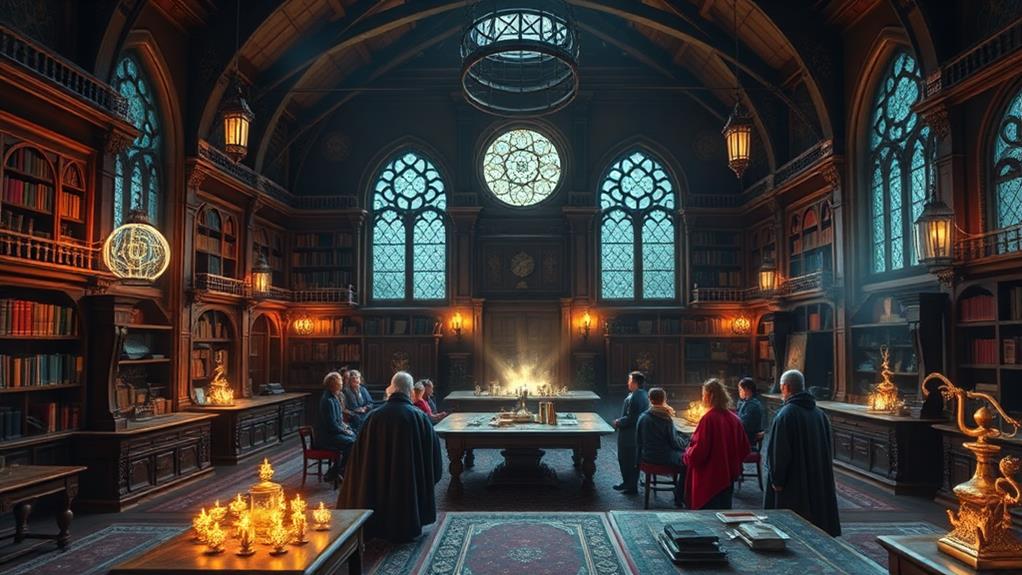
Defending against the Dark Arts is a crucial skill for any aspiring wizard. When you're comparing different wizarding schools, focus on their Dark Arts Defense curriculum. Some schools might offer a more hands-on approach, where you'll practice defensive spells in controlled environments. Others may emphasize theoretical knowledge, making certain you understand the principles behind each spell.
Look into the qualifications and experience of the instructors. Schools with renowned professors who have real-world experience in combating Dark Arts are more likely to provide superior training. You'll want to learn from those who've faced real threats and can impart practical wisdom.
Check the course structure. Is there a progression from basic to advanced defense techniques? Schools that offer an all-encompassing, tiered approach guarantee you build a solid foundation before tackling more complex spells and situations.
Consider the resources and facilities available. Do they have specialized classrooms, magical creatures for practice, and enchanted objects for realistic scenarios? The better the resources, the more prepared you'll be.
Consider Alumni Achievements
A school's alumni achievements can be a strong indicator of the quality of education you can expect. When comparing wizarding schools, take a close look at what their graduates have accomplished. Successful alumni often reflect the institution's ability to provide high-quality education and training. Four key areas to evaluate are:
- Prominent Positions: Check if alumni hold influential roles in the wizarding world, such as headmasters, ministers of magic, or heads of magical departments. This can show the school's capability in nurturing leaders.
- Awards and Honors: Look for alumni who have received significant awards or recognitions. Whether it's the Order of Merlin or other prestigious honors, these accolades can highlight the school's excellence.
- Contributions to Magical Innovations: Identify alumni known for groundbreaking spells, potions, or magical devices. Their contributions can serve as evidence of the school's focus on fostering creativity and innovation.
- Published Works: Investigate if graduates have authored respected books or research papers. Publications in esteemed magical journals or best-selling spellbooks indicate a strong academic foundation.
At a Glance
In the end, comparing wizarding school specialties boils down to knowing the history, curriculum, and faculty. Don't forget to weigh student life and extracurriculars. Pay close attention to potion-making, spellcasting, and dark arts defense courses. Finally, take alumni achievements into account. Remember, "the devil is in the details." By following these tips and digging deep, you'll find the perfect school to suit your magical aspirations. Happy comparing, and may your choice be enchanted!






